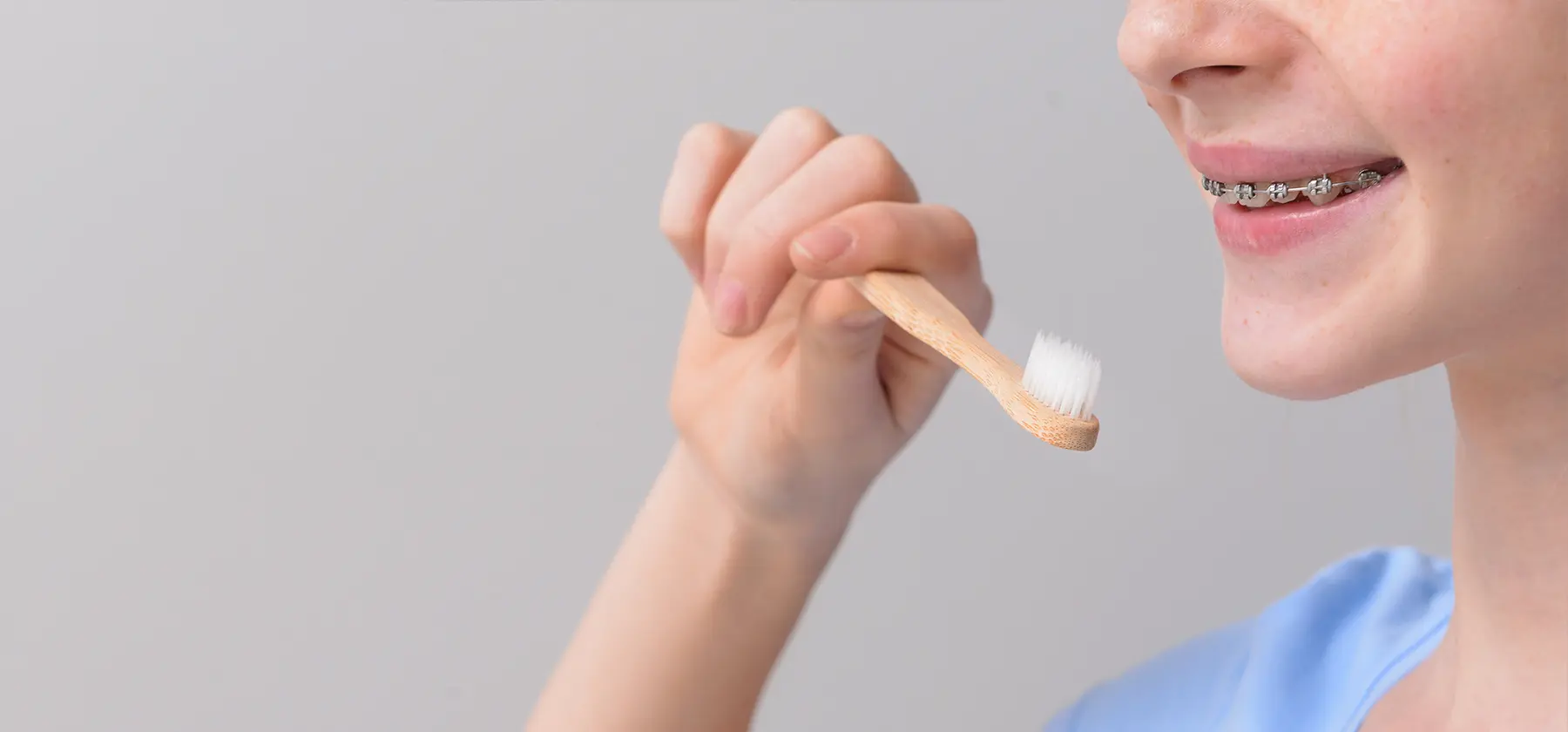
Dealing with Canker Sores from Braces? Tips for Relief
Reviewed by Dr. David Sentelle, DMD, PhD, MPH
Reading time: three minutes.
Braces are a transformative journey toward a beautiful smile, but they can sometimes bring unwelcome guests: canker sores.
These painful ulcers on the soft tissues of the mouth are a common complaint among orthodontic patients.
In this blog, we explain what causes canker sores with braces and how to prevent and treat them.
Table of Contents
Key Takeaway
Canker sores from braces are often caused by friction, poor oral hygiene, or dietary triggers. They can be managed with preventive measures like saltwater rinses, orthodontic wax, and avoiding acidic or spicy foods. If sores persist or cause severe discomfort, schedule a visit with your dentist or orthodontist for professional care.
What Are Canker Sores?
Canker sores (or aphthous ulcers) are small, shallow lesions that develop inside the mouth—on the gums, cheeks, or tongue.
Unlike cold sores (caused by a virus), they are not contagious but can be incredibly tender.
Common triggers include stress, nutritional deficiencies (like iron or B vitamins), and food sensitivities. For those with braces, the connection between braces and canker sores often boils down to physical irritation.
Why Do Braces Cause Canker Sores?
Braces can create extra friction inside the mouth, leading to irritation and discomfort. Several factors contribute to the development of canker sores during orthodontic treatment:
- Friction and tissue injury: The metal brackets and wires of braces can rub against the delicate tissues of the mouth, creating minor cuts or tissue injury. This irritation is a primary cause of the formation of canker sores.
- Poor oral hygiene: Braces make it harder to keep your mouth clean, allowing food particles to trap near brackets. This can inflame the mucous membrane, increasing the risk of infection and development of canker sores.
- Chemical irritants: Toothpaste containing sodium lauryl sulfate (SLS) or eating acidic foods and spicy foods can aggravate sores. Learn more about toothpaste in this blog: Nano-Hydroxyapatite vs. Fluoride: Which Toothpaste Is Better for Your Teeth?
- Dry mouth: Reduced production of saliva (common during braces treatment) leaves tissues vulnerable to irritation.
- Autoimmune conditions: Some individuals are more prone to canker sores due to underlying autoimmune conditions, such as celiac disease, inflammatory bowel disease, or Behçet’s disease. These conditions can cause the immune system to overreact to minor irritations, making the mouth more susceptible to ulcers and prolonged healing times.
Preventive Measures for Canker Sores
Taking steps to prevent canker sores can make wearing braces a more comfortable experience. Here are some simple ways to protect your mouth and reduce irritation:
- Create a smooth barrier: Use orthodontic wax or silicone covers on sharp brackets to protect your oral tissues.
- Prioritize oral hygiene: Brush gently with a soft-bristled toothbrush and floss daily to avoid abrasive foods and debris buildup. Consider an SLS-free toothpaste. Learn proper brushing techniques with braces in this blog: The Right Way to Brush with Braces: Tips for Kids and Teens
- Avoid trigger foods: Steer clear of crunchy foods, acidic foods, and spicy foods that can irritate sores. Opt for simple foods like yogurt or mashed potatoes during flare-ups.
- Saltwater rinses: Mix a teaspoon of salt in warm water and rinse twice daily. This saltwater solution soothes inflammation and speeds up the healing process.
- Stay hydrated: Combat dry mouth by drinking plenty of water to maintain a healthy mucosal barrier.
Tips for Relief
- Home remedies
- Saltwater rinses remain the gold standard for reducing pain and preventing severe infections.
- Apply ice to numb the area.
- Over-the-counter solutions
- Use topical anesthetics to numb the area. Use a cotton swab to apply topical treatments directly to sores.
- Clinical rinses containing hydrogen peroxide can reduce bacteria.
- Orthodontic adjustments
If wires or brackets persistently poke your cheeks, visit your dentist or orthodontist for adjustments. They might add dental silicone or silicone strips to create a protective barrier. - Address underlying issues
If sores persist, consider supplements for nutritional gaps or evaluate conditions like celiac disease or inflammatory bowel disease, which are linked to aphthous stomatitis.
When to Seek Professional Advice
Most canker sores heal within a few weeks. Consult your orthodontist if you experience:
- Sores larger than 1 cm or clusters of fluid-filled blisters (uncommon for canker sores).
- Signs of severe infections (fever, prolonged pain).
- Sores that worsen despite proper care.
Lonestar Kid’s Dentistry: Your Pediatric Dentist in Prosper, TX
Most canker sores heal on their own, but if your child’s sores are persistent, painful, or interfering with eating and speaking, it’s a good idea to see your dentist.
If your child is struggling with discomfort from braces, our team at Lonestar Kid’s Dentistry in Prosper, TX, is here to help. We can recommend treatments to soothe irritation, adjust braces if needed, and ensure your child’s orthodontic journey is as smooth as possible.
To book a visit at our pediatric dental office in Prosper, TX, call (469) 228-4402 visit us at 240 S. Preston Road, Suite 10, Prosper, TX.
